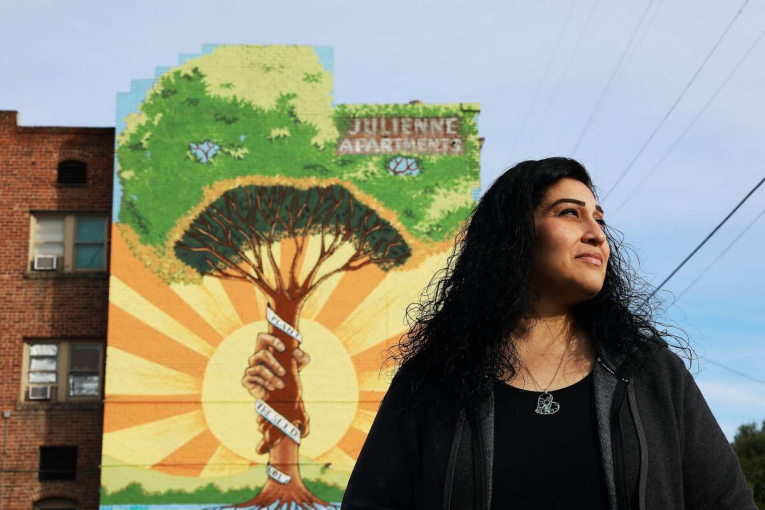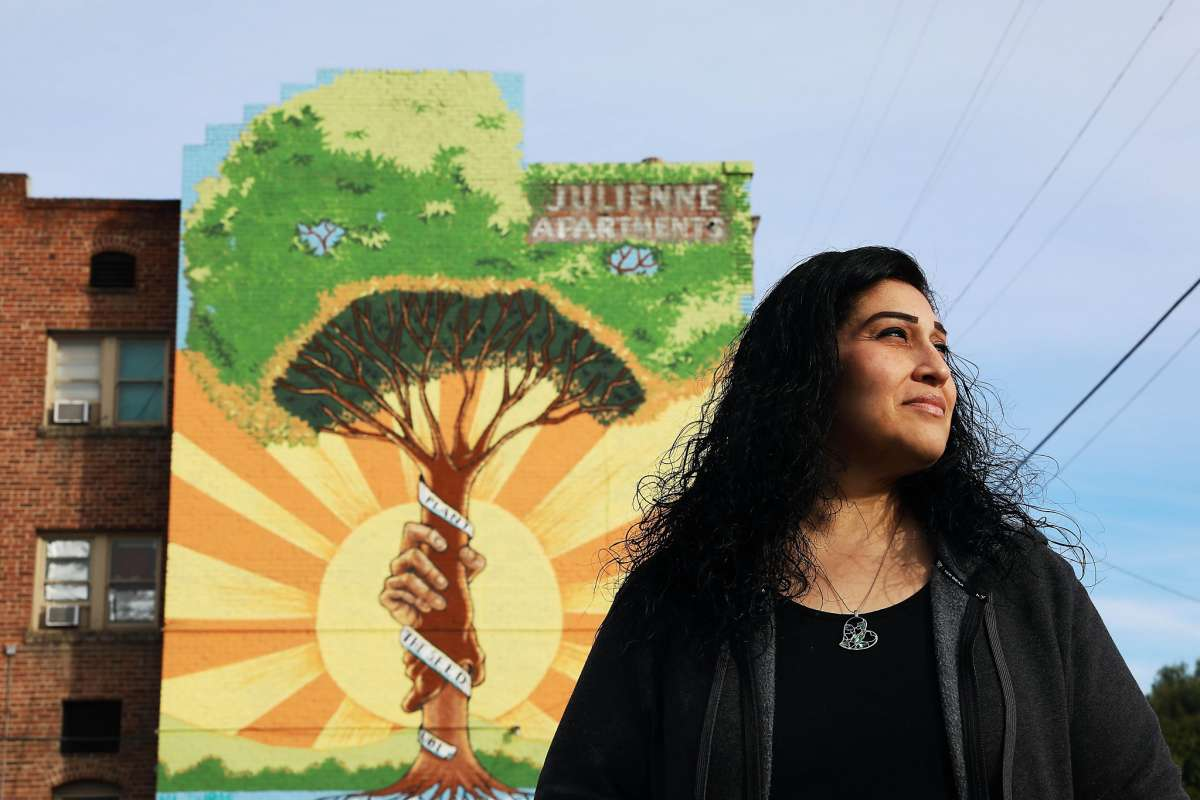

By Tara Abraham
43.5 million Americans live below the poverty line, according to an article published by USA Today. It is atrocious that in one of the world’s wealthiest countries –– where Jeff Bezos can be a billionaire by exploiting others for personal gain –– that so many Americans cannot afford basic necessities, like shelter, affordable healthcare and food.
We may all be struggling during the pandemic, but low-income families are left more vulnerable in this crippling economy. Low-income households deserve a guaranteed basic income monthly unconditional cash payments with no strings attached, especially if they live below the poverty line. A guaranteed income will supplement, rather than replace, the existing social safety net.
As former Stockton Mayor Michal Tubbs states in a Bloomberg Citylab article, “We need a social safety net that goes beyond conditional benefits tied to employment, works for everyone, and begins to address the call for racial and economic justice through a guaranteed income.”
An article by the San Francisco Chronicle tells the story of Lorrine Paradela, a resident at Stockton, who “used to lie awake at night, thoughts racing over how she would pay her expenses. She would get up in the morning exhausted.”
Paradela worked two jobs: one with special needs students and the other in a home for autistic teenagers. She is a single mother of two kids and took care of her mother, who has cancer. And even with working two jobs, Paradela was barely scraping by and felt embarrassed because she was financially struggling.
But in 2018, things started looking up for Paradela when she was randomly selected out of a group of 125 participants to be a part of a program that gives unconditional cash payments of $500 every month.
This program called Stockton Economic Empowerment (SEED) was the nation’s first mayor-led guaranteed-income demonstration, led by former mayor Michael Tubbs. The money comes from individual and foundation philanthropy, with the initial $1 million in funding coming from the Economic Security Project, co-chaired by Facebook co-founder Chris Hughes.
According to a discussion paper published by SEED, SEED is born out of the simple belief that the “best investments we can make are in our people.”
“The stakes are simply too high for the single mother working two jobs and still living below the poverty line; for the man who spends four hours commuting daily for a job that doesn’t cover his rent – for us not to try something new.”
While a guaranteed income cannot solve societal problems, it can “increase stability for low-income households reaffirming their dignity,” according to the discussion paper.
The guaranteed income is meant to be a hand-up, not a hand-out, as it will “empower its recipients financially and reveal that poverty results from a lack of cash, not character.”
Some of you may be perplexed by the idea of unconditional cash payments. Why give people an incentive not to work or free money that they can misuse?
If you think this, then you must also be driven by the ideology of pulling yourself by the bootstraps. To this, I ask you what if people don’t have boots? What then?
Please don’t blame the poor for our economy’s faults; poverty is not a personal choice but a reflection of a flawed society.
As stated in a New York Times opinion article by Facebook Co-founder Chris Hughes, “If we want to create a more resilient economy and country, a guaranteed income should be permanent American policy, not just an emergency measure to help during this pandemic.”
It may take years before we know the full results of the SEED. Contrary to stereotype wrongfully attached to the indigent, Stockton’s recipients typically spent 40 percent on food each month and only about 2 percent on “self-care or recreation,” according to a Bloomberg Businessweek article.
The extra money made significant improvements to recipients because they didn’t have to worry as much about their finances. “They reported that their stress was reduced, that they could work more easily and stay healthier, and that they had more time with their families.”
Varying forms of guaranteed income were tested in other areas of America and the world. Since 1997, tribal members in North Carolina were given an average of $4,000 and $6,000 a year through the Eastern Bank of Cherokee Indians Casino Dividend, as stated by a VOX article. Economists found that it doesn’t make them work less, but it did lead to improved education and mental health and decreased addiction and crime.
As for Lorrine Paradela, the Stockton resident, “The extra money made it a little bit easier to sleep, to breathe better.” She was able to get a new car after getting in a car crash. She could cut back on one of her jobs and spend more time with her children. Paradela also returned to school to obtain a bachelor’s degree.
Before leaving office, Michael Tubbs started the Mayors for Guaranteed Income coalition, intending to “invest in additional guaranteed-income pilots and advocate for state and federal cash-based policies,” according to the TIMES article. As of now, 34 mayors around the nation joined the coalition. Many of these programs benefit from private funding and philanthropic investment with public dollars.
According to the Bloomberg City Lab article, “As we enter a second year of the pandemic, more than 10 million Americans are unemployed and 26 million hungry.” The introduction of stimulus checks during the pandemic gives us a glimpse into an America that values its people by giving guaranteed income to low-income households.
Among all the pain and sorrow unleashed by the coronavirus, we mustn’t ignore what many low-income people knew all along, that our current economic system is fragile and deeply flawed.
It is high time that the United States government upholds our constitution’s values that we have “certain unalienable rights, that among these are Life, Liberty and the pursuit of Happiness” –– which has far too often left low-income families behind.
Implementing guaranteed income nationwide will create a morally just and resilient economy that works for all Americans.

Tara Abraham is a third-year transfer student pursuing a Communications major at UC Davis. She was born and raised in the Sacramento area.
Support our work – to become a sustaining at $5 – $10- $25 per month hit the link:

Thanks for the article, Tara.
I am a long time advocate of a UBI. The pandemic has demonstrated graphically the inadequacy of our current system of tying an individual’s basic needs to securing “a job”, regardless of whether their full-time work is sufficient to support them or not. While I believe this should apply nationally, I realize this is not a majority belief and so am very interested in pilot projects such as this to establish best practices with a goal of providing a safety net such that no one is living below the poverty line.
When you first started mentioning this, I thought it was highly unlikely to ever occur.
I no longer think that, for more than one reason.
I have 2 questions. Illegal immigrants how much do they get when they come across the border?
My second question is who’s going to pay for it ?
Note from “moderator” –
Please stay on-topic.
Even though it is, in a broader sense.
Two legitimate on topic questions. However, answering the first question isn’t important until we decide that we want a UBI. They are two independent questions and we shouldn’t reject a UBI for everyone just because we’ve decided that we’ll include undocumented aliens. But I agree who qualifies is an important question.
On the second, there are several methods, with the most straightforward being a national net asset tax. If we assume that 20% of adults are eligible for a monthly payment of $1,000, that is roughly $700 billion annually. The total US net household asset value is $113 trillion (of which 95% is in registered financial instruments and real estate), so this could be paid with a 0.6% surcharge on net asset value. The median household asset value is about $100,000, so this would be a tax of $600/year on average. Note that the amount of charitable giving was about $450B in 2019, and that Social Security paid $892B in 2019, so this is on a scale comparable with other programs and contributions.
https://www.federalreserve.gov/releases/z1/20191212/z1.pdf
Those who support UBI would likely opine that $1,000/month is only about 1/3 (or less) of what was fair, and just… $12,000 year just brings you to “poverty level”…
So if one owns a Davis house valued at say $800,000, a 401K at $500,000 and a savings account of $50,000 they would be looking at a yearly net asset value extra tax of $8,100?
Ron, I think you would make a very good moderator.
Thanks, Chris!
But the “pay” isn’t high enough.
Yeah but think of the benefits you would get plus the power you would have ?
speaking simply from a blue collar workers point of view it seems that money going from the people through the government and back to the people is ridiculously inefficient. So much bureaucracy turns every dollar into 15 cents by the time it gets back. But I guess that’s probably the difference between EQ and IQ.
I think that the idea is to follow the “Robin Hood” model.
Which for some reason, never seems to pan-out.
Though maybe in this case, it’s take it from the “artificial intelligence robots”, and give it to the poor.
You do speak the truth Ron.
If people we’re given UBI who would want to mow our grass or other low level jobs. Artificial intelligence could replace School teachers and professors and maybe even wives and husbands that would be interesting…
If you’ve been following the financial news lately, the Robin Hood model is under great scrutiny.
It is high time that the United States government upholds our constitution’s values that we have certain unalienable rights, that among these are Life, Liberty and the pursuit of other people’s money.
That seems to be the way we’re headed…
I wonder if it did for their “patrons”, as well. (Sarcasm intended.)
Or, if it led to any internal disagreements (e.g., “who” is in the tribe, how it’s divided, etc.).
And beyond that, whether a given “tribe” qualifies as one in the first place.
For that matter, do tribes ever “muscle-in” on each other’s “action”? For example, are there laws regarding how far apart casinos must be?
Count me as “not a fan” of this entire situation, and the monopoly on casinos based upon “race”.
Actually, this article notes some other downside to Native American populations, themselves:
https://www.stlpublicradio.org/projects/fixed-odds/for-native-americans-tribal-casinos-help-and-hurt/
RO, agree with all your casino comments. No people ever gained moral integrity by running a gambling operation.
Tara Abraham
Thank you very much for the article it was a lot of fun.
You had me at ‘randomly selected’.
ROFL! It’s a lotto!
Uh huh.
Good thing, as co-founder of Facebook, our friend Chris wasn’t one of those billionaires that exploit others for person gain, LOL.